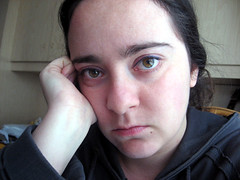 It definitely seems harder to roll out of bed every morning when the temperature drops and sunrise comes later. Whether it’s chronic fatigue or a case of the seasonal blues, many people experience fatigue when the weather cools. However, if you are suffering from extreme fatigue, it could be one of these energy suckers getting you down:
It definitely seems harder to roll out of bed every morning when the temperature drops and sunrise comes later. Whether it’s chronic fatigue or a case of the seasonal blues, many people experience fatigue when the weather cools. However, if you are suffering from extreme fatigue, it could be one of these energy suckers getting you down:
Dehydration
Turns out that even the slightest bit of dehydration can make you feel sluggish and lack concentration. Dehydration means that your body does not have as much water and fluids as it should. It can be mild, moderate, or severe based on how much of the body’s fluid is lost or not replenished. Next time your feeling groggy, try downing a glass or two of water.
Cell Phones
Feeling restless at night? You probably looked your cell phone before sleep. Research shows that checking your phone before bed amps up brain activity, which makes it harder to fall asleep. According to a study by the National Sleep Foundation in 2011, 20 percent of folks between the ages of 19 and 29 are awakened by a call, text or e-mail at least a few nights a week. If you want to get a better night’s sleep, consider powering down before bedtime.
Medication
Are currently on any medications? Some drugs have energy-sapping side effects. Antidepressants and certain beta-blockers used to prevent migraines or treat high blood pressure rank high upon that list. If you’re on one of these medications and start to feel lethargic, consult your doctor for an alternative. Or, consider taking your dose right before you head to bed.
Overtraining
While working out is great for your physical and mental health, especially when it comes to releasing endorphins, adrenaline, serotonin and dopamine. However, overtraining can actually increase cortisol production. Cortisol is the body’s natural stress response hormone. It is typically released during a crisis situation when your adrenals sometimes can’t keep up. But if it’s released too frequently, it can cause you to feel weak or tired.
Low Iron
Iron is a mineral in your body that shuttles oxygen around and removes waste from your cells. If you’re not getting enough iron a day your body will struggle to function properly. People with low iron levels can suffer from anemia. Therefore, to boost iron in your diet consider eating more red meat, egg yolks, dried fruit, beans and scallops. If you’re still feeling sluggish, take a supplement or consult a doctor.
If you’re feeling tired all the time, don’t just shrug it off. Give yourself a couple weeks to make some serious lifestyle changes. Get more sleep, cut back on social gatherings, take some vitamins and eat more wholesome foods. But, if you’re still feeling fatigued after these changes, you should seek professional help.
Attached Images:
-  License: Creative Commons image source
Julie Smith is a freelance writer and nutritionist. She believes a healthy diet and active lifestyle is the keep to a better, happier you. When life gets stressful, Julie takes anxiety remedies that are natural from NativeRemedies.com.
 For people who live in the Northern Hemisphere, the change in autumn means more hours of darkness and colder weather, which keeps many people indoors. This can contribute to depression and a host of sleep disorders.
For people who live in the Northern Hemisphere, the change in autumn means more hours of darkness and colder weather, which keeps many people indoors. This can contribute to depression and a host of sleep disorders.